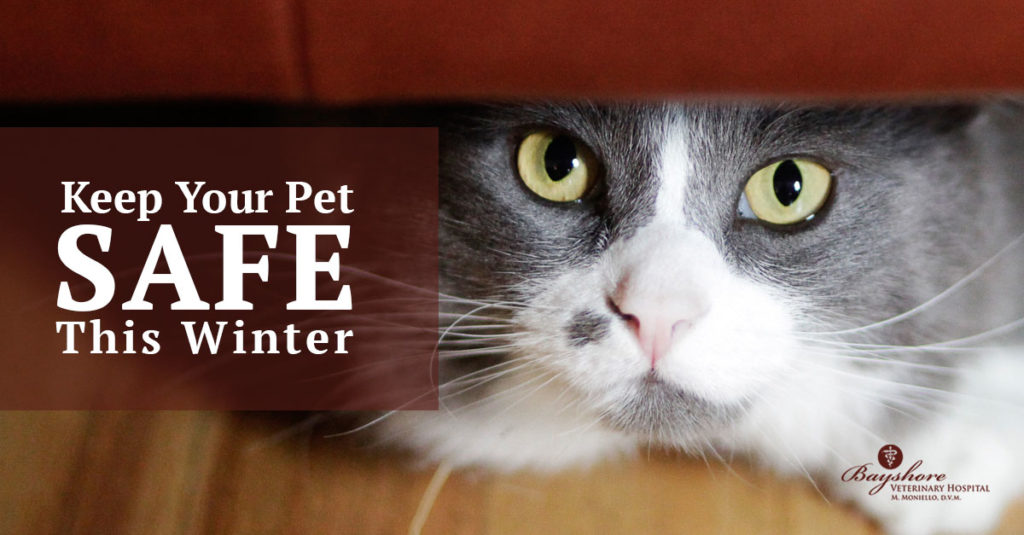As we head towards the first day of winter on December 21st, it’s important to remember that during the month of December, holiday celebrations and the onset of winter weather, create complex challenges for the pets we love.

Inside the home, increased use of electrical extension cords, tinsel decorations, and ribbon (especially wired ribbon), are a few of the things that trigger an increase in veterinary emergencies for both dogs and cats! Tinsel and ribbon can’t be digested, and accumulate in the digestive tract, forming an intestinal blockage that requires surgical intervention. Hanging lights and dangling decorations attract unwanted attention that can have potentially catastrophic consequences. If you have a pet drawn to electrical wires, please note that injuries from electrocution are reported every holiday season! When choosing your decorations, be sure to evaluate their impact on your pet, and be extra careful if you’re a cat owner. We all know how curious our kitties can be.
Celebrations with friends and family bring out holiday foods that also account for a marked uptick in sick visits during December. Keep sweets…especially chocolate…out of reach, along with caffeinated beverages and alcohol. Remind your guests that sharing with your pets is not in their best interest, and you’d rather they didn’t! The surefire way to protect your pets from the perils of festivities is to keep them in a separate part of the house, away from unwanted food and guests who might not be accustomed to having pets underfoot.
New Year’s fireworks and noisemakers will evoke the same fear response as 4th of July fireworks, so keep your pets safe and secure when celebrations are in full swing! While dogs tend to run away, cats tend to hide. Whichever pet you have, keep them indoors, and make sure they have access to their safe haven of choice.
In addition to holiday safety pointers, there are basic cold weather safety tips to keep in mind. A rule of thumb is that if you’re feeling cold, chances are your pets are, too. Make sure they have a warm, dry spot away from drafts to stay safe. When you bring them in from the outdoors, make sure to dry their coats. Dogs get frostbite on their paws so take that into consideration when you head out for a walk. Remember to avoid ice melting products sprinkled on sidewalks…they aren’t always “pet friendly”! Wipe down their paws to keep them from ingesting any toxic residue when they lick them clean. For dogs that enjoy bounding through snow drifts, remember to remove any accumulated snow/ice clumps from the paws…especially between the toes. The easiest way to do this is to place each paw in some warm (not hot) water and allow it to melt naturally, drying the paw off when you’re finished. Don’t tug the ice off…pulling the fur can be painful and if the ice is attached to the skin, removing it that way can result in injury to the tissue.
Pay extra attention to your pet’s coat and skin during the winter months. Like our skin, the outdoor cold and indoor heating systems tend to leave them dry and a little flaky. Fewer baths are a good thing during the winter to prevent drying them out even more. To help keep them warm, let their fur grow longer during the winter, and use sweaters/coats to help them retain body warmth.
On those bitterly cold days we sometimes experience, be sure to limit their outdoor time to absolute necessity. Remember, if it’s too cold for you…it’s too cold for them, especially if they are short haired, or smaller breeds.
Most importantly, if you suspect a problem, don’t delay having your pet seen by a veterinarian. Quick intervention can help avert a possible tragedy at any time of the year! Call us today at (732) 671-3110.
